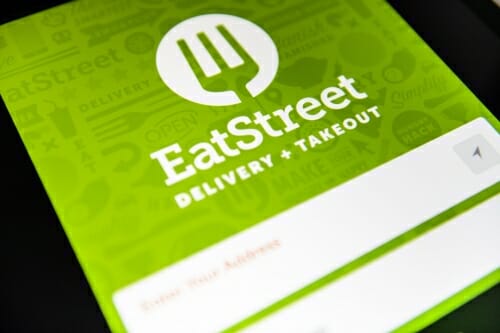EatStreet prospers eight years after idea was cooked up by UW-Madison students

Matt Howard, chief executive officer at EatStreet, is pictured in the company’s downtown Madison office. EatStreet is an online food ordering and delivery service developed by three UW–Madison alumni, including Howard. Photo: Bryce Richter
EatStreet, a Madison tech startup that enables online delivery orders at more than 15,000 restaurants in 250-plus cities nationwide, continues to build on an offer that a restaurant can’t refuse.
“Our pitch is simple,” says CEO Matt Howard. “We drive incremental orders to your restaurant that you would not have if you weren’t listed on EatStreet. We will market you every day and you only pay if we get you an order. Why would you not do this?”
That “what do you have to lose?” sales pitch is little changed since Howard and two fellow UW–Madison students founded the business in 2010. Customers use the EatStreet app or website to order food.
But as EatStreet expanded and outgrew a series of offices, one stumbling block emerged: Delivery. For a restaurant, getting food to its customers – hot and on-time – carries incremental costs of staffing, order timing and bookkeeping.
So in 2017, EatStreet bought a Philadelphia-based delivery service called Zoomer and launched delivery in seven cities, including Madison, Milwaukee and other top EatStreet markets.

A car with the EatStreet logo, driven by CEO Matt Howard, makes its way down a Madison street. Photo: Bryce Richter
“By offering delivery, we can offer our diners access to many more restaurants, and that makes our product better for hungry customers,” Howard says. “We want our customers to have the best experience, and if you don’t control the delivery process, that can’t happen. Our goal is to have every order delivered within 50 minutes of being placed. And we empower our customers to track their delivery from order to doorstep.”
Offering delivery has changed the business, Howard says. “Before, our only job was to get more orders for our restaurants. Now it’s not just marketing; we handle all the logistics for restaurant partners.”
Although adding 900-odd delivery drivers to about 150 core employees “adds another layer of complexity and responsibility,” Howard says. “We know delivery is the future of EatStreet, and our drivers are dedicated EatStreet employees, not contractors.”
EatStreet’s sales force targets restaurants in a few cities at a time, shunning major metro areas in favor of smaller college markets. “We handle everything for the restaurant from data entry to delivery,” Howard says. “They just have to start accepting orders.”

The EatStreet app, an online food ordering and delivery service developed by three UW–Madison alumni, including CEO Matt Howard, is pictured on Feb. 26, 2018. (Photo by Bryce Richter / UW–Madison) Photo: Bryce Richter
Phone-based customer service for restaurant managers and diners is available 20 hours a day, seven days a week, Howard says, and is based in the Madison office. “We pride ourselves on customer responsiveness. They can contact us with any issue, any question.”
EatStreet has raised $38.5 million from investors, and that adds further responsibility, says Howard, who grew up near Neenah in tiny Larsen, Wisconsin.
“Matt and the EatStreet team are laser-focused on solving their customers’ problems,” says Dan Olszewski, professor of entrepreneurship at the Wisconsin School of Business. “They are creative and work nonstop to find those solutions. I would also attribute much of their success to having set the very ambitious goal of being a market leading, nationwide player in their industry. Striving to reach that very lofty goal has driven much of their growth.”
The technical product itself, EatStreet’s online ordering platform, is a key factor in the company’s category leadership. “Simplicity is king on the website and app,” Howard says. “We strive to be the smartest shortcut from hungry to happy for our diners. The ordering experience has got to be intuitive, easy and fast!”
Running a startup takes more energy than you would expect, Howard says, “but it’s one of the most rewarding things you will ever do. I get to work with some of the most talented people in the world every single day.”
Ideally, EatStreet will become large and profitable enough to attract a buyer or a public stock sale. Yet even though such an “exit” could force Howard to find a new career path, he says “exits are a very good thing. We need to show that these Madison innovators can make investors money through a sale or an IPO [initial public offering]. We need capital to get exits, and we need success stories and exits to get capital.”
As with many other Wisconsin startups, UW–Madison played a critical role, Howard says. He and fellow students Alex Wyler and Eric Martell were motivated in 2010 by a 75-cent surcharge while placing an online order from a local restaurant. “We set out to offer a better service to both restaurants and their customers. We faced problems, of course, but we got through them.”
EatStreet relies on UW–Madison graduates and students, Howard says. “The majority of our sales interns, who are calling restaurants, are UW–Madison students. We also have many students working in our customer support center to ensure our restaurant clients are happy with our service.”
Several campus programs were instrumental to the young business. A business plan competition now named for the Wisconsin School of Business gave the company a $10,000 prize and free office space in 2011. “More than funding, we gained access to some amazing entrepreneurs in Madison, who were judges and are still mentors today, seven years later,” Howard says.
“Without UW–Madison, I don’t know if we would have survived,” Howard concludes. “Madison has helped EatStreet flourish, and even as we grow and reach new milestones as a national brand, we have no intention of leaving Madison. It’s home, and we have no reason to leave.”




